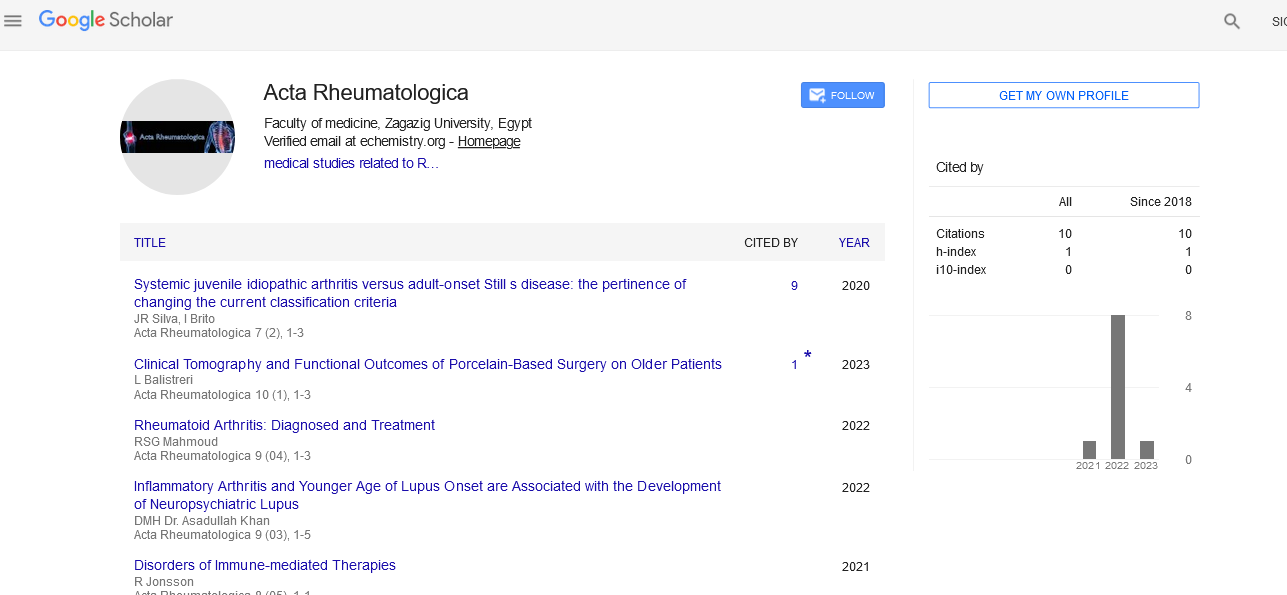Perspective - (2024) Volume 11, Issue 3
Navigating Treatment Strategies: A Comprehensive Approach to Improving Health Outcomes
Avgoustina Kyriakou*
Department of Health Care, University of Cyprus, Nicosia, Cyprus
*Correspondence:
Avgoustina Kyriakou, Department of Health Care, University of Cyprus, Nicosia,
Cyprus,
Email:
Received: 21-May-2024, Manuscript No. IPAR-24-14803;
Editor assigned: 24-May-2024, Pre QC No. IPAR-24-14803 (PQ);
Reviewed: 07-Jun-2024, QC No. IPAR-24-14803;
Revised: 18-Jun-2024, Manuscript No. IPAR-24-14803 (R);
Published:
25-Jun-2024
Introduction
Effective treatment strategies play a pivotal role in managing a
wide range of health conditions, from acute illnesses to chronic
diseases, offering hope, relief, and the potential for improved
quality of life. In this article, we embark on a journey through
the landscape of treatment strategies, exploring the principles of
evidence-based care, the diversity of therapeutic modalities, and
the importance of personalized approaches in optimizing health
outcomes for individuals across the lifespan.
At the heart of effective treatment strategies lies the principle
of evidence-based practice, which integrates the best available
research evidence, clinical expertise, and patient preferences to
inform decision-making and guide therapeutic interventions.
Randomized Controlled Trials (RCTs), systematic reviews, and
meta-analyses serve as the cornerstone of evidence-based
medicine, providing rigorous methods for evaluating the
efficacy, safety, and cost-effectiveness of healthcare
interventions. Clinical practice guidelines, developed by expert
panels and professional organizations, synthesize evidence into
actionable recommendations to assist clinicians in delivering
high-quality care tailored to individual patient needs.
Description
Pharmacological interventions
Pharmacotherapy remains a cornerstone of treatment for many
health conditions, offering targeted approaches to alleviate
symptoms, modify disease progression, and improve outcomes.
Medications encompass a diverse array of agents, including
antibiotics, analgesics, antihypertensives, antidepressants,
antidiabetic agents, and immunosuppressants, among others.
Pharmacological treatment strategies aim to optimize therapeutic
efficacy while minimizing adverse effects, drug interactions, and
treatment-related complications. Individualized approaches to
medication management account for factors such as age, sex,
comorbidities, genetic variability, and patient preferences,
fostering shared decision-making and treatment adherence.
Non-pharmacological interventions
Beyond pharmacotherapy, non-pharmacological interventions
play a crucial role in enhancing health outcomes and promoting
holistic well-being. Lifestyle modifications, including diet,
exercise, smoking cessation, and stress reduction techniques,
serve as foundational pillars of preventive and therapeutic
strategies for chronic diseases such as cardiovascular disease,
diabetes, and obesity. Behavioral interventions, such as
Cognitive-Behavioral Therapy (CBT), Mindfulness-Based Stress
Reduction (MBSR), and motivational interviewing, target
maladaptive behaviors, thoughts, and emotions, promoting selfmanagement
skills and resilience. Additionally, Complementary
and Alternative Medicine (CAM) modalities, including
acupuncture, chiropractic care, massage therapy, and herbal
remedies, offer adjunctive approaches to symptom management
and health promotion, often in conjunction with conventional
treatments.
Surgical interventions
Surgical interventions represent a cornerstone of treatment
for many acute and chronic conditions, offering curative or
palliative approaches to restore function, alleviate symptoms,
and improve quality of life. Surgical procedures encompass a
wide range of specialties, including general surgery, orthopedic
surgery, neurosurgery, cardiovascular surgery, and plastic
surgery, among others. Advances in minimally invasive
techniques, robotic-assisted surgery, and image-guided
interventions have revolutionized surgical practice, offering
precision, efficiency, and reduced morbidity compared to
traditional approaches. Patient-centered surgical care involves
shared decision-making, preoperative optimization, perioperative
support, and postoperative rehabilitation to optimize surgical
outcomes and facilitate recovery.
Psychotherapy and counseling
Psychotherapy and counseling represent essential
components of treatment strategies for mental health disorders,
offering a supportive and therapeutic environment for
individuals grappling with psychological distress, emotional challenges, and interpersonal difficulties. Various
psychotherapeutic modalities, including Cognitive-Behavioral
Therapy (CBT), Psychodynamic Therapy, Interpersonal Therapy
(IPT), Dialectical Behavior Therapy (DBT), and Acceptance and
Commitment Therapy (ACT), aim to alleviate symptoms, improve
coping skills, and promote adaptive behaviors and thought
patterns. Counseling interventions, such as supportive
counseling, motivational interviewing, and crisis intervention,
offer compassionate support and guidance during times of crisis,
grief, or life transitions.
Integration of multidisciplinary care
Optimal treatment strategies often involve the integration of
multidisciplinary care teams comprising healthcare professionals
from diverse specialties, disciplines, and backgrounds.
Multidisciplinary care models foster collaboration,
communication, and coordination among clinicians, ensuring
comprehensive assessment, individualized treatment planning,
and holistic support for patients with complex health needs.
Interdisciplinary teams may include physicians, nurses,
pharmacists, psychologists, social workers, physical therapists,
occupational therapists, dietitians, and other allied health
professionals, working together to address the physical,
psychological, social, and spiritual dimensions of health and
illness.
Conclusion
Treatment strategies represent a multifaceted approach to
improving health outcomes and enhancing quality of life for
individuals across the lifespan. By embracing evidence-based
practice, tailoring interventions to individual patient needs, and
fostering collaboration among healthcare providers and patients,
we can optimize therapeutic efficacy, minimize treatmentrelated
risks, and promote holistic well-being. As we navigate the
landscape of treatment strategies, armed with knowledge,
empathy, and a commitment to patient-centered care, we forge
a path towards a future where health disparities are reduced,
and individuals thrive in health and vitality.
Citation: Kyriakou A (2024) Navigating Treatment Strategies: A Comprehensive Approach to Improving Health Outcomes. Acta Rheuma Vol:11 No:3





